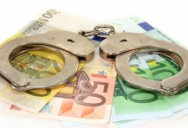
Parliament backs new rules to crack down on money laundering and organised crime
Date
Tue, 07/10/2018
Sections
Justice & Home Affairs
The European Parliament’s civil liberties, justice and home affairs committee, today backed two reports designed to make it harder for organised criminals and terrorists to access their illegally gained funds. The proposals will make it easier for authorities to freeze and confiscate illegally obtained assets across borders and crack down on money laundering. An agreement between the Council, Commission and Parliament was reached on the new laws last week.
S&D Group Spokesperson for the report on Mutual Recognition of Freezing and Confiscation Orders, Emilian Pavel MEP, said:
“Organised crime is an EU-wide issue, to tackle it we need to have an effective EU-wide response. Freezing and confiscation of assets gained by criminal activities is an important part of this. It allows you to both deprive criminals from the proceeds obtained from criminal activities, while confiscation can be also used to compensate victims or boost law enforcement activities. Today’s vote means that we will have mutually recognised laws across the EU, thus making it easier for national authorities to tackle an issue that goes beyond national borders.
“For our Group, it was essential to ensure that these new tools could only be used for their intended purpose. We secured important amendments to protect fundamental rights and ensure strong procedural safeguards.”
S&D Group spokesperson on the directive on countering money laundering by criminal law, Ana Gomes MEP, said:
“The S&D Group has been leading the fight in the European Parliament for transparency, exchange of information and the fight against money laundering. Too often complex tax planning and financial opacity hides the activities of not just rich individuals and companies looking to avoid paying their fair share of tax, but also criminal’s groups looking to hide their illegal gains. Today’s vote on the harmonisation of criminal laws on money laundering will make it easier for financial intelligence units to exchange information regarding criminal investigation on money laundering or terrorist financing, helping to tackle this EU wide issue.
“These new measures must go hand-in-hand with greater transparency. We need to know who really owns companies and trusts. This information needs to be available not just to authorities, but made public, so that journalists and whistle-blowers can expose dodgy or illegal dealings.”
Agenda
Tue, 03/10/2026 - 10:00

